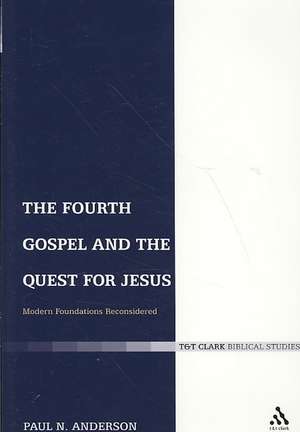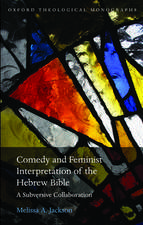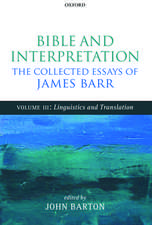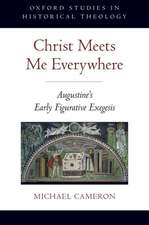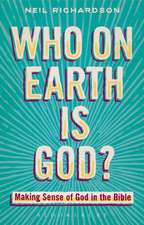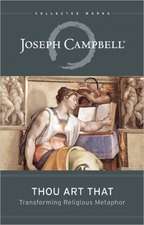The Fourth Gospel and the Quest for Jesus: Modern Foundations Reconsidered: The Library of New Testament Studies
Autor Ph.D. Paul N. Andersonen Limba Engleză Paperback – 11 dec 2007
Din seria The Library of New Testament Studies
- 34%
 Preț: 509.52 lei
Preț: 509.52 lei - 22%
 Preț: 832.58 lei
Preț: 832.58 lei - 22%
 Preț: 832.09 lei
Preț: 832.09 lei - 24%
 Preț: 190.33 lei
Preț: 190.33 lei - 22%
 Preț: 832.65 lei
Preț: 832.65 lei - 23%
 Preț: 191.31 lei
Preț: 191.31 lei -
 Preț: 221.70 lei
Preț: 221.70 lei -
 Preț: 98.92 lei
Preț: 98.92 lei - 31%
 Preț: 830.87 lei
Preț: 830.87 lei - 22%
 Preț: 834.60 lei
Preț: 834.60 lei - 22%
 Preț: 831.59 lei
Preț: 831.59 lei - 30%
 Preț: 717.05 lei
Preț: 717.05 lei - 22%
 Preț: 835.03 lei
Preț: 835.03 lei - 30%
 Preț: 511.40 lei
Preț: 511.40 lei - 24%
 Preț: 190.33 lei
Preț: 190.33 lei -
 Preț: 158.77 lei
Preț: 158.77 lei - 30%
 Preț: 510.04 lei
Preț: 510.04 lei - 22%
 Preț: 832.99 lei
Preț: 832.99 lei - 30%
 Preț: 509.52 lei
Preț: 509.52 lei - 22%
 Preț: 832.80 lei
Preț: 832.80 lei - 22%
 Preț: 831.76 lei
Preț: 831.76 lei - 22%
 Preț: 834.93 lei
Preț: 834.93 lei - 22%
 Preț: 831.59 lei
Preț: 831.59 lei - 22%
 Preț: 832.41 lei
Preț: 832.41 lei - 22%
 Preț: 832.99 lei
Preț: 832.99 lei -
 Preț: 414.71 lei
Preț: 414.71 lei - 30%
 Preț: 773.65 lei
Preț: 773.65 lei - 22%
 Preț: 834.93 lei
Preț: 834.93 lei - 14%
 Preț: 511.81 lei
Preț: 511.81 lei -
 Preț: 222.16 lei
Preț: 222.16 lei - 30%
 Preț: 775.67 lei
Preț: 775.67 lei - 30%
 Preț: 1012.49 lei
Preț: 1012.49 lei - 30%
 Preț: 509.02 lei
Preț: 509.02 lei - 30%
 Preț: 656.90 lei
Preț: 656.90 lei -
 Preț: 469.92 lei
Preț: 469.92 lei -
 Preț: 471.68 lei
Preț: 471.68 lei -
 Preț: 173.21 lei
Preț: 173.21 lei - 30%
 Preț: 833.64 lei
Preț: 833.64 lei - 22%
 Preț: 834.93 lei
Preț: 834.93 lei - 31%
 Preț: 772.17 lei
Preț: 772.17 lei - 30%
 Preț: 774.20 lei
Preț: 774.20 lei - 14%
 Preț: 1124.92 lei
Preț: 1124.92 lei - 22%
 Preț: 948.51 lei
Preț: 948.51 lei - 14%
 Preț: 1128.84 lei
Preț: 1128.84 lei - 31%
 Preț: 1065.91 lei
Preț: 1065.91 lei - 22%
 Preț: 777.71 lei
Preț: 777.71 lei - 31%
 Preț: 1064.84 lei
Preț: 1064.84 lei - 22%
 Preț: 1063.44 lei
Preț: 1063.44 lei - 22%
 Preț: 889.49 lei
Preț: 889.49 lei - 22%
 Preț: 1006.06 lei
Preț: 1006.06 lei
Preț: 298.25 lei
Preț vechi: 335.43 lei
-11% Nou
Puncte Express: 447
Preț estimativ în valută:
57.07€ • 60.01$ • 47.16£
57.07€ • 60.01$ • 47.16£
Carte tipărită la comandă
Livrare economică 16-30 aprilie
Preluare comenzi: 021 569.72.76
Specificații
ISBN-13: 9780567033307
ISBN-10: 0567033309
Pagini: 256
Dimensiuni: 156 x 234 x 18 mm
Greutate: 0.36 kg
Editura: Bloomsbury Publishing
Colecția T&T Clark
Seria The Library of New Testament Studies
Locul publicării:London, United Kingdom
ISBN-10: 0567033309
Pagini: 256
Dimensiuni: 156 x 234 x 18 mm
Greutate: 0.36 kg
Editura: Bloomsbury Publishing
Colecția T&T Clark
Seria The Library of New Testament Studies
Locul publicării:London, United Kingdom
Caracteristici
This book will help readers better evaluate the complex issues related to the critical studies of John, Jesus, and history, and it will provide several innovative ways forward.
Cuprins
Preface
Part I Modern Foundations for the Critical Investigation of John, Jesus, and History
A. The Story of John's Historical Marginalization
1) The Traditional View and its Advocates-From Papias to Schleiermacher; 2) Modern Challenges and Advances-From Brettschneider to Bultmann; 3) Critiques of Modern Hypotheses-From Lightfoot to Carson; 4) The Transcendence of Modernism-From Brown to Staley
B. Findings as Beginnings-Recent Approaches to the Fourth Gospel
1) The "Traditional" View: John's Apostolic Authorship; 2) The "Critical" View: John's Employment of Alien (non-Johannine) Sources; 3) Markan-Dependence Theory; 4) Midrashic-Development Approaches; 5) Historicized Drama Hypotheses 6) Multiple Editions of John; 7) The History of the Johannine Situation.
C. A New Synthesis Advanced
Part II John, Jesus, and History-The Relevance of the Investigation
A. Planks in Platform A: The De-Historicizing of John-Strengths and Weaknesses 1) John's Differences with the Synoptics; 2) Synoptic Omissions in John; 3) Johannine Omissions in the Synoptics; 4) The Johannine Jesus Speaks and Acts in the Mode of the Evangelist; 5) The Johannine Material is Rendered in Response to the History of the Johannine Situation; 6) The Johannine Evangelist Spiritualizes and Theologizes According to His Purposes
B. Planks in Platform B: The De-Johannification of Jesus-Strengths and Weaknesses 1) John's Similarities with the Synoptics-Especially Mark; 2) John's Composition: Diachronic or Synchronic?; 3) The Lateness of John Diminishes Historical Validity; 4) Criteria for Determining Historicity; 5) The History of Religions Background of John; 6) Emerging Portraits of Jesus Conclusion
Part III John and the Synoptics-From Inferiority to Interfluentiality
A. Approaches to the Problem 1) John as Derivative From the Synoptics; 2) John as Independent of the Synoptics; 3) The Posteriority of John; 4) The Priority of John; 5) An Autonomous-Yet-Not-Disconnected Tradition
B. John's Relation to Mark: Interfluential, Augmentive, and Corrective 1) John and Mark: An "Interfluential Set of Relationships" during the Oral Stages of their Respective Traditions; 2) John's Augmentation of Mark; 3) John's Correcting of Mark?
C. John's Influence upon Luke: Formative, "Orderly," and Theological 1) John's Formative Influence Upon Luke; 2) Does John Provide a Basis for Luke's "Orderly" Account?; 3) Did the Johannine Tradition Contribute to Luke's Theology?; 4) Acts 4:19-20-A First-Century Clue to Johannine Authorship?
D. Contacts Between John and Q? 1) The "Bolt out of the Johannine Blue"-Johannine Influence upon Q; 2) Johannine Motifs Appearing in Q; 3) Johannine Narratives Appearing in Q
E. John's Relation to Matthew: Reinforcing, Dialectical, and Corrective 1) Matthean and Johannine Sectors of Christianity: Reinforcing Each Other's Missions and Tasks; 2) Dialectical Relations Between Johannine Christianity and Intramural Centralizing Tendencies; 3) The Finalized Gospel of John: A Corrective to Rising Institutionalism in the Late First-Century Church Conclusion
Part IV Jesus in Bi-Optic Perspective-Contributions to the Jesus Quest from Synoptic and Johannine Sources
A. Synoptic Contributions to the Quest for the Jesus of History 1) Jesus' teachings about the Kingdom of God in parables; 2) Jesus' use of short, pithy sayings illustrating the wisdom and way of the Kingdom; 3) Jesus' healing and exorcizing ministries and his sending out his disciples to do the same; 4) Jesus' confronting of religious authorities and cleansing the Temple as prophetic challenging of purity laws restricting access to God; 5) Jesus' dining with "sinners" and healing on the Sabbath as provocations toward renewal; 6) Jesus' extolling the love of God and love for others as fulfillments of the Law; 7) Jesus' death and appearances as narrated in post-resurrection consciousness
B. Johannine Contributions to the Quest for the Jesus of History 1) Jesus' relationship with John the Baptizer in declaring the prolific availability of purification; 2) Jesus' early cleansing of the Temple as an inaugural prophetic sign designed to get the attention of religious authorities and others regarding his message; 3) Jesus' ministry over more than one year, allowing the movement to build momentum; 4) Jesus' public ministry beginning in settings other than the home of Simon Peter's mother-in-law and vicinities; 5) Jesus' going to and from Jerusalem, like most observant Jews, and performing signs in the south as well as the north; 6) Jesus' last supper being a common meal rather than a Passover meal 7) Jesus' teaching about the life of the Spirit and unmediated access to God's leading and love
Part V Modern Foundations Reconsidered- Implications for the Critical Investigation of John, Jesus, and History
A. John's Tradition-Rooted in History but Developed Theologically
B. Johannine Contributions to the Study of Jesus-Unexamined Possibilities
Part I Modern Foundations for the Critical Investigation of John, Jesus, and History
A. The Story of John's Historical Marginalization
1) The Traditional View and its Advocates-From Papias to Schleiermacher; 2) Modern Challenges and Advances-From Brettschneider to Bultmann; 3) Critiques of Modern Hypotheses-From Lightfoot to Carson; 4) The Transcendence of Modernism-From Brown to Staley
B. Findings as Beginnings-Recent Approaches to the Fourth Gospel
1) The "Traditional" View: John's Apostolic Authorship; 2) The "Critical" View: John's Employment of Alien (non-Johannine) Sources; 3) Markan-Dependence Theory; 4) Midrashic-Development Approaches; 5) Historicized Drama Hypotheses 6) Multiple Editions of John; 7) The History of the Johannine Situation.
C. A New Synthesis Advanced
Part II John, Jesus, and History-The Relevance of the Investigation
A. Planks in Platform A: The De-Historicizing of John-Strengths and Weaknesses 1) John's Differences with the Synoptics; 2) Synoptic Omissions in John; 3) Johannine Omissions in the Synoptics; 4) The Johannine Jesus Speaks and Acts in the Mode of the Evangelist; 5) The Johannine Material is Rendered in Response to the History of the Johannine Situation; 6) The Johannine Evangelist Spiritualizes and Theologizes According to His Purposes
B. Planks in Platform B: The De-Johannification of Jesus-Strengths and Weaknesses 1) John's Similarities with the Synoptics-Especially Mark; 2) John's Composition: Diachronic or Synchronic?; 3) The Lateness of John Diminishes Historical Validity; 4) Criteria for Determining Historicity; 5) The History of Religions Background of John; 6) Emerging Portraits of Jesus Conclusion
Part III John and the Synoptics-From Inferiority to Interfluentiality
A. Approaches to the Problem 1) John as Derivative From the Synoptics; 2) John as Independent of the Synoptics; 3) The Posteriority of John; 4) The Priority of John; 5) An Autonomous-Yet-Not-Disconnected Tradition
B. John's Relation to Mark: Interfluential, Augmentive, and Corrective 1) John and Mark: An "Interfluential Set of Relationships" during the Oral Stages of their Respective Traditions; 2) John's Augmentation of Mark; 3) John's Correcting of Mark?
C. John's Influence upon Luke: Formative, "Orderly," and Theological 1) John's Formative Influence Upon Luke; 2) Does John Provide a Basis for Luke's "Orderly" Account?; 3) Did the Johannine Tradition Contribute to Luke's Theology?; 4) Acts 4:19-20-A First-Century Clue to Johannine Authorship?
D. Contacts Between John and Q? 1) The "Bolt out of the Johannine Blue"-Johannine Influence upon Q; 2) Johannine Motifs Appearing in Q; 3) Johannine Narratives Appearing in Q
E. John's Relation to Matthew: Reinforcing, Dialectical, and Corrective 1) Matthean and Johannine Sectors of Christianity: Reinforcing Each Other's Missions and Tasks; 2) Dialectical Relations Between Johannine Christianity and Intramural Centralizing Tendencies; 3) The Finalized Gospel of John: A Corrective to Rising Institutionalism in the Late First-Century Church Conclusion
Part IV Jesus in Bi-Optic Perspective-Contributions to the Jesus Quest from Synoptic and Johannine Sources
A. Synoptic Contributions to the Quest for the Jesus of History 1) Jesus' teachings about the Kingdom of God in parables; 2) Jesus' use of short, pithy sayings illustrating the wisdom and way of the Kingdom; 3) Jesus' healing and exorcizing ministries and his sending out his disciples to do the same; 4) Jesus' confronting of religious authorities and cleansing the Temple as prophetic challenging of purity laws restricting access to God; 5) Jesus' dining with "sinners" and healing on the Sabbath as provocations toward renewal; 6) Jesus' extolling the love of God and love for others as fulfillments of the Law; 7) Jesus' death and appearances as narrated in post-resurrection consciousness
B. Johannine Contributions to the Quest for the Jesus of History 1) Jesus' relationship with John the Baptizer in declaring the prolific availability of purification; 2) Jesus' early cleansing of the Temple as an inaugural prophetic sign designed to get the attention of religious authorities and others regarding his message; 3) Jesus' ministry over more than one year, allowing the movement to build momentum; 4) Jesus' public ministry beginning in settings other than the home of Simon Peter's mother-in-law and vicinities; 5) Jesus' going to and from Jerusalem, like most observant Jews, and performing signs in the south as well as the north; 6) Jesus' last supper being a common meal rather than a Passover meal 7) Jesus' teaching about the life of the Spirit and unmediated access to God's leading and love
Part V Modern Foundations Reconsidered- Implications for the Critical Investigation of John, Jesus, and History
A. John's Tradition-Rooted in History but Developed Theologically
B. Johannine Contributions to the Study of Jesus-Unexamined Possibilities
Recenzii
"...Anderson has offered an interesting volume which includes many valuable insights and a welcome challenge to the critical consensus in John-Synoptic studies. At many points, the book rightly exposes the manner in which much critical scholarship can become so entrenched in its own orthodoxy that it fails to consider other alternatives that are on the table...this volume makes a positive contribution to the areas of John-Synoptic studies and should be read by all those interested in joining the dialogue." -Michael J. Kruger, Journal of the Evangelical Theological Society, March 2008
Reviewed in International Review of Biblical Studies, 2007.
'The conclusions are [...] broadly persuasive.' Theological Book Review, Volume 20, No 2, 2008
'This extremely interesting and instructive work creates a middle path between the harmonization and distortion of historicity in John. It deserves attention! The author lays open the aporias (perplexities) in the Johannine text and then proposes workable solutions for the furthering of Johannine exegesis. I warmly recommend this book.'
'A careful, thorough and fair presentation and evaluation of the range of views, with a nuanced critical approach and balanced conclusions that are sure to invite much rethinking of traditional paradigms.' Craig Keener, Eastern Seminary, USA
'This volume challenges biblical scholars to rethink the foundations of much of our study. It will, I believe, make readers assess their own methods and stimulate new discussions of John and the quest for Jesus.'
'Paul Anderson has in his masterful The Fourth Gospel and the Quest for Jesus traced the history of the Gospel of John ever since its getting kicked upstairs as the "spiritual gospel" by the early church down to its elimination from the quest of the historical Jesus in modern times; he then reassesses what role John might in fact play in learning more about the historical Jesus.'
Reviewed by Paul Foster, Expository Times, 01/08/07
"Paul Anderson's Fourth Gospel and the Quest for Jesus clearly enters a dialogue betweengospel studies and historical Jesus studies that is critically entrenched and opinionated. Anderson is well aware of the battle lines and carefully navigates between them, not ignoring them, and is able to cordially offer a better way. This reviewer thinks he does this well. There is much to appreciate in his approach. He clearly wants to participate in the discussion, a long-standing discussion, and help bring together distinct aspects of the same dialogue. In a way, Anderson has come to the rescue of an undersog who is being bullied and outnumbered three-to-one." - RBL
"As historical Jesus studies continue on to new heights, Paul Anderson calls attention to the omission of the Gospel of John and the over reliance on the Synoptic Gospels in this line of research. The Fourth Gospel and the Quest for Jesus is well-written and has a clear structure. The text will familiarize the reader with the history of scholarship on the gospel and provide and nuanced approach to the historicity of John that will prove useful as historical Jesus studies continue" Mark Lee Genter, TBR
Reviewed in International Review of Biblical Studies, 2007.
'The conclusions are [...] broadly persuasive.' Theological Book Review, Volume 20, No 2, 2008
'This extremely interesting and instructive work creates a middle path between the harmonization and distortion of historicity in John. It deserves attention! The author lays open the aporias (perplexities) in the Johannine text and then proposes workable solutions for the furthering of Johannine exegesis. I warmly recommend this book.'
'A careful, thorough and fair presentation and evaluation of the range of views, with a nuanced critical approach and balanced conclusions that are sure to invite much rethinking of traditional paradigms.' Craig Keener, Eastern Seminary, USA
'This volume challenges biblical scholars to rethink the foundations of much of our study. It will, I believe, make readers assess their own methods and stimulate new discussions of John and the quest for Jesus.'
'Paul Anderson has in his masterful The Fourth Gospel and the Quest for Jesus traced the history of the Gospel of John ever since its getting kicked upstairs as the "spiritual gospel" by the early church down to its elimination from the quest of the historical Jesus in modern times; he then reassesses what role John might in fact play in learning more about the historical Jesus.'
Reviewed by Paul Foster, Expository Times, 01/08/07
"Paul Anderson's Fourth Gospel and the Quest for Jesus clearly enters a dialogue betweengospel studies and historical Jesus studies that is critically entrenched and opinionated. Anderson is well aware of the battle lines and carefully navigates between them, not ignoring them, and is able to cordially offer a better way. This reviewer thinks he does this well. There is much to appreciate in his approach. He clearly wants to participate in the discussion, a long-standing discussion, and help bring together distinct aspects of the same dialogue. In a way, Anderson has come to the rescue of an undersog who is being bullied and outnumbered three-to-one." - RBL
"As historical Jesus studies continue on to new heights, Paul Anderson calls attention to the omission of the Gospel of John and the over reliance on the Synoptic Gospels in this line of research. The Fourth Gospel and the Quest for Jesus is well-written and has a clear structure. The text will familiarize the reader with the history of scholarship on the gospel and provide and nuanced approach to the historicity of John that will prove useful as historical Jesus studies continue" Mark Lee Genter, TBR
